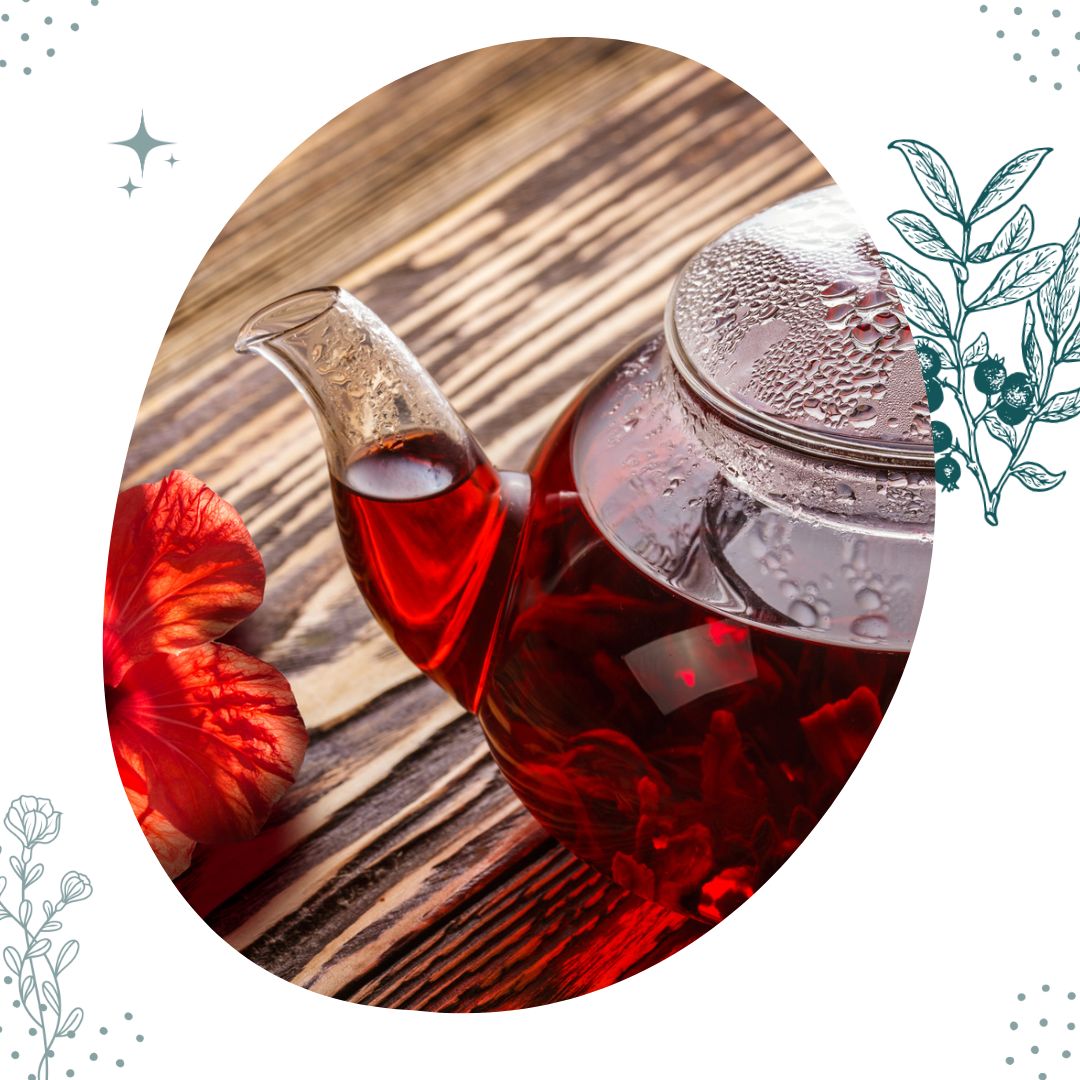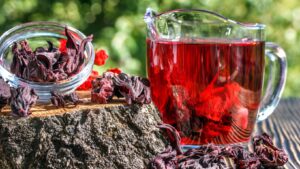Ingredients Rose (Rose centifolia) & Hibiscus (Hibiscus sabdariffa)
Family: Malvaceae
Suggested Use: Add 1 teaspoon to a tea strainer in a cup, pour boiling water over the herb, leave for 7-15 minutes and enjoy.
For a non-alcoholic refreshing drink, let cool, refrigerate, add tonic or sparkling water, stir and enjoy.
Caution: Keep out of reach of children.
We recommend consulting with a qualified healthcare practitioner before taking any herbs or supplements, particularly if you are pregnant, nursing, taking medications, or have a pre-existing condition.
*This product and information has not been evaluated by the Food and Drug Administration. This product and information is not intended to diagnose, treat, cure, or prevent any disease. For Educational purposes only.
Store in a cool dry area away from direct sunlight.
*Daily value not established
Potential Hibiscus Tea Benefits: Why Your Body Loves It
Get comfortable and sip this beautiful garnet red tea and breathe deep, enjoying the exotic flavour of hibiscus flowers as you cozy up with this magical herbal tea. Hibiscus flowers are picked from the plant and turned into a beautiful deep red tea with a delicious tart flavor and a heap of potential health benefits. You can leave the tea to cool, add sparkling water, or tonic water and create your own herbal Mocktail/ cocktail!
It’s a beautiful infusion that is delicious whether served hot and steaming, or when chilled with ice as a refreshing summer pick-me-up. It also has the benefit of being caffeine-free, making it a delectable choice for those wanting to sip all the health benefits of hibiscus flowers without the caffeine crash.
The pretty buds can also be found in a ton of tinctures and syrups and are often added to food recipes in remedies that span the globe.
So aside from the pretty name, the perfect garnet flower, and the tart fruit taste, what else can Hibiscus tea bring to the table? Click here to find out…
Potential Health Benefits of Hibiscus Tea
Often compared to the flavor of lemony cranberry juice, drinking hibiscus tea brings a wealth of health benefits. Loaded with nutrients, stuffed with antioxidants, and here to help you deal with everything from hypertension to reducing heart disease risks, weight loss and help support immune system health, welcoming the floral power of hibiscus tea into your daily routine is a great way to boost your life in all the right ways. Take a look at all the heavenly hibiscus tea …
Sipping on hibiscus tea may work wonders when it comes to potentially cutting down on your cholesterol levels. This unique little flower that is turned into hibiscus extract has been studied to see if it had a positive impact on high blood pressure and cholesterol. During one study, 90 participants with high cholesterol who sipped hibiscus twice a day for 15 days had an increase in their HDL cholesterol levels. While LDL cholesterol and triglycerides. While more studies still need to be done for exact results, this gives us the excuse to put the kettle on.
Loaded with antioxidants, drinking hibiscus tea may help give your body the power it needs to fight off free radicals and reduce oxidative stress and damage. Free radicals can wreak havoc on our overall health and wellbeing and upset your cells. Not only do free radicals massively contribute to speeding up the aging process (especially when it comes to the skin), but they are also linked with health conditions and a whole range of diseases including cancer, dementia, diabetes, and heart disease, among others. In a comparison on tea and antioxidant content, hibiscus tea hit the number one spot thanks to its soaring levels, even smashing the popular green tea off the top charts. For those who want to stay young and fresh and free from inflammation, it’s time to top up your antioxidants with a cup or two of hibiscus tea.
Heart health and blood pressure are truly where the sour and delicious hibiscus tea seems to shine. One study suggested that just drinking three cups of tea in adults at risk of hypertension was enough to see a drop in their systolic blood pressure in comparison to those given a placebo. Chock full of anti-inflammatory properties, hibiscus tea may be great for your heart health and may help to keep your blood pressure where it needs to be.
While bodyweight is a complex issue and dealing with unhealthy obesity requires a proper schedule of exercise and lifestyle changes, hibiscus tea is considered to be a contender in potentially helping with body fat. More studies are needed but from the info collected, it suggested that sipping hibiscus tea for 3 months potentially lowered body weight and cut down on abdominal fat. Pretty good for a tea that tastes so delicious.
Getting cosy with a cup of hibiscus tea may help boost Vitamin C and possibly give your immune system a much-needed boost. Vitamin C is one of the major players for fending off colds and flu that come with the seasonal change. This vibrant red tea can help boost your vitamin and mineral intake, the Vitamin C can also help your body to fend off all kinds of infections. In short, all it takes is a cup to feel as strong as a Warrior.
In addition to all those benefits, Hibiscus may potentially be beneficial in supporting those with Type 2 diabetics and managing blood sugar. Studies done on animals suggest that the extract of hibiscus potentially lowered blood glucose by up to 12%. As hibiscus is also low in sugar and light in calories it won’t throw your levels off the charts. The added bonus of being able to encourage HDL cholesterol levels and lowering the LDL levels brings another exciting angle for diabetics looking for a lush healing tea to help them support their health.
If you have been living the high life, or just want to support your liver, sipping hibiscus tea can be just the ticket. This pomegranate-colored beverage has been studied for helping to prevent liver damage as it may help increase the concentration of detoxifying enzymes. While these studies were conducted using hibiscus extract and more human studies are needed, it suggests that hibiscus tea may be a useful tool in supporting the liver.
Like many herbs, Hibiscus is rich in polyphenols, Polyphenols are compounds that are loaded with anti-cancer properties. During test tube studies undertaken, hibiscus extract was seen to reduce cell growth and help stop plasma cell and mouth cancer. Other studies also showed the tropical plant leaf from preventing prostate cancer growth from spreading, and inhibited stomach cancer cells up to 52%. Of course more studies need to be done before they can create a wonder drug, but in the meantime you could enjoy this delicious tea.
Not content with doing all of the above, Hibiscus could potentially help keep at bay the Bacteria that are responsible for a whole host of health problems both short term and long term. From bronchitis to UTI’s, keeping the body defense optimised when it comes to bacteria is a great way to stay feeling great. Not only does hibiscus tea come with a host of antioxidants, but it also is chockful of potentially antibacterial properties. Test tube studies have suggested that hibiscus extract may inhibit E-coli and in other studies hibiscus was also seen to fend off eight different strains of bacteria. Of course, more human-based studies are needed for a clearer picture, but we will be enjoying hibiscus in our cups.
Not only will you find Vit C in this tea, but you will also find Vitamin K which helps bone metabolism (think absorption of calcium and magnesium) and blood clotting. Hibiscus tea also contains copper and potassium, which are an essential source of iron and keep our nerves and immune system functioning. Finally, it also has anthocyanins which are responsible for that rich ruby coloring but also helps to prevent chronic disease and are ripe with antibacterial benefits too.
11) Pushes Off Cravings
It seems that this sour tea can help to keep cravings at bay thanks to its sweet fruity notes and low-calorie count. Next time you have an urge to reach for the pantry and pull out something sugary for a quick hit, you could just make yourself a hibiscus tea and feed your body’s needs instead.
12) Digestion
We love a little after-dinner sip to stop us feeling bloated and heavy and ready for bed. Again, hibiscus tea makes an amazing aperitif every time. As hibiscus tea works as mother nature’s diuretic, it pulls salt from the body all while keeping you hydrated and as regular as can be. As it’s also low in sugar and not a caffeinated tea, you can sip it all night long without worrying about it interrupting sleep.
13) Kidneys
Still doing the good work from tip to toe, hibiscus tea also gets to work on keeping your kidneys flushed and fabulous. Animal studies have shown that hibiscus helped to prevent calcium crystals turning into those tough and terrible kidney stones. Of course, more research needs to be done to check it’s a similar outcome for humans, but this is a great start for those who want to steer clear of kidney stones.
Easy Hibiscus Tea Recipe
Now you know all the benefits that come with the simple act of boiling water and adding dried hibiscus flowers, there’s plenty of reasons to brew up this floral delight. While a warm cup is always welcome, we love the sour tang of a tropical iced tea made with hibiscus. Not only is it a visual thirst quencher but the aroma and gorgeous coloring just scream summer. Take a look at this easy to make hibiscus iced tea recipe…
- Half a cup of dried hibiscus flowers
- 8 cups of water
- Honey to taste
- Lime to taste
- Put the water in a pot and add the hibiscus flowers.
- Bring to a boil and then switch off and let steep for 15 minutes.
- At the point of steeping you can add in a dash of lime, a couple teaspoons of honey as a natural sweetener, or any extra flavoring you love. Other herbs that work well with hibiscus include lemongrass and basil.
- Strain the tea and let it chill in the refrigerator for a couple of hours.
- Serve in a tall glass with plenty of ice and a sprig of mint or with a fresh hibiscus flower for vacation vibes.
Side Effects
Loaded with health benefits, low in sugar, and light on the calories – hibiscus tea is a safe and delicious drink that isn’t commonly linked with side effects. Yet, it can have an impact on estrogen levels so pregnant women and those who are breastfeeding may want to check in with their medical professional before pouring themselves this tea. It is also known to contribute to low blood pressure levels and blood sugar levels so those who are sensitive to that should also seek advice first. Another point worth noting is the fact that hibiscus tea has hydrochlorothiazide properties (it’s a diuretic), so do consume with care. Those who are sensitive to caffeinated tea can enjoy hibiscus tea as it is caffeine-free.
Wrap Up
Hibiscus tea is a delicious treat any time of day. The slightly sour taste is full of tang, the color a true treat when you want to serve something bright and beautiful, and all the health benefits come in as an added bonus. From a delicious cocktail base to a cozy cup on the sofa, hibiscus tea is the perfect reminder of how plant power can be the perfect remedy.
What are your thoughts on hibiscus tea? Do you find the sour tea sip worthy or do you enjoy other teas instead? Share your thoughts in the comments.
The hibiscus plant often loves to sun itself in tropical climates. Often found soaking up the warmth in far-flung places like Hawaii and Africa, this plant goes by a bunch of botanical names including its full title – Hibiscus Sabdariffa or Roselle. Before blooming, the trumpet-like flowers are buds called calyces and these are harvested to be added into the tea. Even the lush green bulb and the calyx are chosen to be turned into H. sabdariffa tea.
We do have an amazing Hibiscus that is hardy enough to live here in the Adirondacks! The flowers are bigger than my head!
Medical Disclaimer: While we have delved into the research available on the health benefits of these teas, this is for informative purposes only and shouldn’t be taken as medical advice. Those who have any health-related queries should reach out to a medical professional. These statements have not been evaluated by the Food and Drug Administration. This article is not intended to diagnose, treat, cure, or prevent any disease. For educational purposes only






